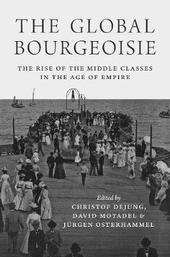
|
The Global Bourgeoisie: The Rise of the Middle Classes in the Age of Empire
Hardback
Main Details
| Title |
The Global Bourgeoisie: The Rise of the Middle Classes in the Age of Empire
|
| Authors and Contributors |
By (author) Christof Dejung
|
|
By (author) David Motadel
|
|
By (author) Jurgen Osterhammel
|
| Physical Properties |
| Format:Hardback | | Pages:396 | | Dimensions(mm): Height 235,Width 156 |
|
| Category/Genre | World history
Economic history |
|---|
| ISBN/Barcode |
9780691195834
|
| Classifications | Dewey:305.55 |
|---|
| Audience | | Tertiary Education (US: College) | | Professional & Vocational | |
|---|
| Illustrations |
2 b/w illus.
|
|
Publishing Details |
| Publisher |
Princeton University Press
|
| Imprint |
Princeton University Press
|
| Publication Date |
26 November 2019 |
| Publication Country |
United States
|
Description
The first global history of the middle class While the nineteenth century has been described as the golden age of the European bourgeoisie, the emergence of the middle class and bourgeois culture was by no means exclusive to Europe. The Global Bourgeoisie explores the rise of the middle classes around the world during the age of empire. Bringin
Author Biography
Christof Dejung is professor of modern history at the University of Bern. David Motadel is associate professor of international history at the London School of Economics and Political Science. Jurgen Osterhammel is professor emeritus of modern and contemporary history at the University of Konstanz.
Reviews"This well-conceived work is a must-read for students interested in the global history of the bourgeoisie and its relationship with the emergence of modern capitalism worldwide."---Giampaolo Conte, Journal of European Economic History "This is a very important book that makes abundantly clear that the emergence of the middle class and bourgeois culture in the nineteenth century was by no means exclusive to Europe or even necessarily emanated from Europe."---Jeffrey Auerbach, World History Connected "The impressive breadth of the chapters is matched by a sense of analytical depth stressing the connections among global bourgeois elites and comparisons of the characteristics, behaviors, and visions that cut across national cases. . . . Reading The Global Bourgeoisie affirms the view that global history as a subfield has matured remarkably over the last three decades."---J. Laurence Hare, International Social Science Review "One of the major intellectual projects in central European history during the last two decades of the 20th century was the study of the Burgertum. . . . Since that time, global history-global in expanding the comparative perspective outside the wealthier countries of the North Atlantic, but also in placing world-wide interactions at the center of historical structures and developments-has become steadily more influential. The current volume, a collection of essays based on a workshop held in Cambridge in 2015, is an attempt to take the Burgertum project global."---Jonathan Sperber, Francia Recensio "The anthology offers the reader a fascinating, impressive picture of the 'global bourgeoisie.' Taken together, the cohesive body of contributions-based on original sources such as contemporary travel reports, newspapers, autobiographical texts, scientific publications, and administrative and trading documents-demonstrate that a historical understanding of the middle classes as a European or Western phenomenon does not do justice to its global historical character."---Ruth Nattermann, H Soz Kult "[The] feat of composing a global social history of the middle classes is deserving of praise and recognition, particularly given that, in the growing field of global history, such a project is no doubt a particularly difficult undertaking. 'Global history meets social history' could have been the subtitle of this anthology. The volume is an attempt to move away from a global history of migrants, brokers and global players to a global social history of classes and social groups. . . . Its framework could neither be more fundamental nor more encompassing; it also offers research goals and explanatory models for a future global social history."---Lutz Raphael, Soziopolis "[An] innovative, intelligent, readable, revolutionary work of global history."---Hartmut Kaelble, Historische Zeitschrift
|